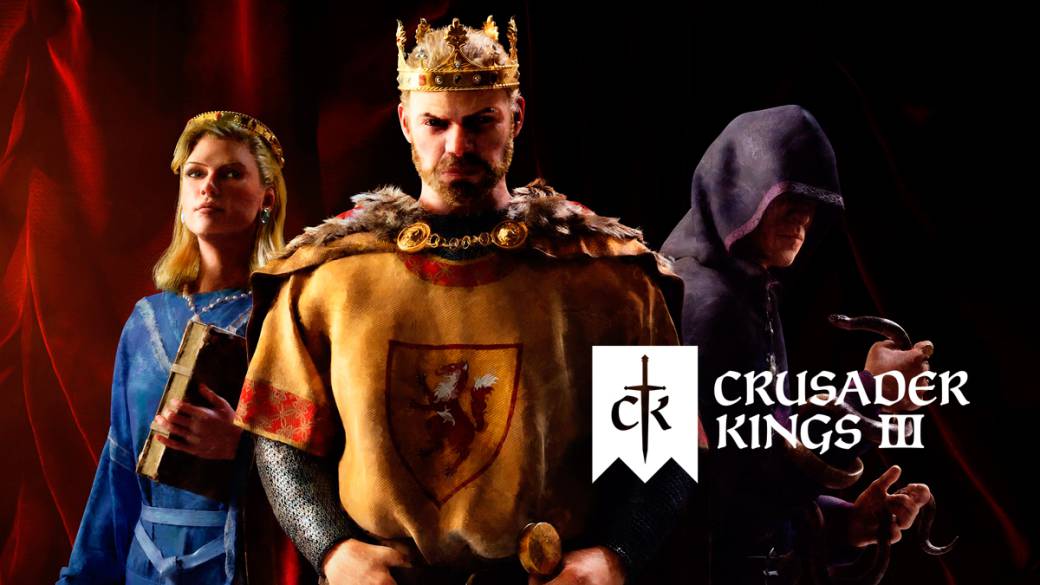
We immerse ourselves in history through the destinies of the great families that shaped the future of nations
Crusader Kings III is the third installment in the grand strategy saga developed and published by the Swedish company Paradox. The work proposes the player to manage a dynasty in time, between the 9th and 15th centuries, and in space, from the western Maghreb to China and from Russia to the Sahel. The breadth and power of the game is extraordinary. The game is already on sale and it is one of the great surprises that this 2020 leaves us.
The main novelty of the new installment resides in the subject and in how it conditions the verb, the mechanics, and the predicate, the rest of the elements. The core of the first iteration lay in territorial conquest and the creation of great feudal domains through war. Crusader Kings II changed this trend throughout its many expansions and shifted, with great popular acceptance, the focus from territorial conquest to dynastic management. This new installment ends the process and bets its full potential on this management and on the relationships that are established between its different members. The subject is now the dynasty and the player’s task will be to preserve its existence and magnify it along the way through the meticulous control of the main character. The mechanics, the verbs that the player has at their disposal within the game, have been adapted to this new reality, enhancing the possibilities of intrigue in addition to the events related to the characters, who now take on even more fundamental importance for the development of the game. departure. This new installment, although it remains within high strategy, could be defined as a role-playing game, in fact its official description defines it as a game of “drama and intrigue.”
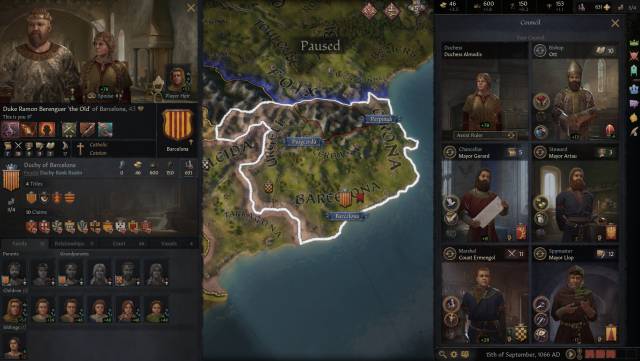
The Crusader Kings license, and especially its second installment, was primarily responsible for Paradox’s commercial take-off. Since its launch on the market, on February 14, 2012, it has reaped figures that have allowed the Swedish company to grow and become a giant capable of absorbing other studios and opening new offices, the last one in Barcelona. In addition, the expansion system was born alongside him, which has become a characteristic feature of the Swedish company. Crusader Kings II has maintained from 2012 to 2020 the interest, the number of players and its useful life thanks to the constant updating of its contents and mechanics, which amount, to date, to fifteen large expansions and other many small modifications. A commercial logic that, although it started timidly with Europa Universalis III, was not applied in a systematic way until Crusader Kings II and all the strategy titles that came after (Europa Universalis IV, Hearts of Iron IV, Stellaris and Imperator: Rome). Therefore, it is important to understand when dealing with Crusader Kings III that we are facing a base game that will be expanded and refined over the years. Of course, this fact does not mean that we examine it as an independent work with value in itself, but without ever losing sight of the fact that we are facing a living title in the process of construction.
The first aspect that catches the eye of Crusader Kings III is its new appearance compared to the previous games of the company. This system, already tested at Imperator: Rome, has been polished and refined for this new installment. If previously the studio used the Clausewitz development engine, now they have created the Jomini development engine for the occasion, in honor of the Napoleonic general Antoine-Henri Jomini. This new code is expressly designed for strategy video games in two dimensions, as is the case of the most recognized titles of the company, and allows greater speed and efficiency, also facilitates the work of the community of “modders” or anonymous creators of content, one of the great pillars, and source of workers, for the Swedish studio. On the surface, certain elements also change, now the map is a living entity that changes depending on the decisions made by the player and shows the scenario with a detail and definition unprecedented in the saga. In fact, compared to the complete map presented by other great strategy titles, Crusader Kings III reproduces what has already been seen previously in Imperator: Rome and it will be possible to build cities, fortresses or churches, the three types of territory that the game allows, again completely modifying the map. A construction that will have its visual representation.
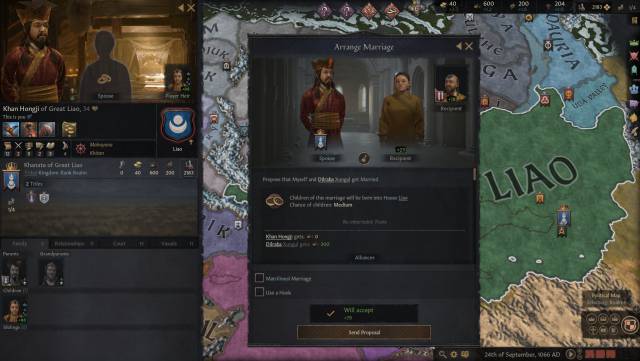
Family and intrigue
At the beginning of the game, the player will be able to choose between different starting dates distributed between the 9th and 15th centuries. These are designed to control characters recognized by the public such as Guillermo the Conqueror, Roberto de Sicilia or Alfonso VI de León. The more elaborate and event-ridden preconfigured beginnings are restricted to Western Europe, a decision that points to further development of the other spaces in future expansions. If we choose to play as any ruler, a gigantic map of the world known to Europeans at that time will open before us. In it we can choose any ruler from any part of that world. The rulers are still divided into three steps: count, duke and king, with different variants: baron, bishop, emperor, etc., and names according to the culture of the place.
Once the game has started, the interface will be familiar to anyone already familiar with the titles of the Swedish company. The main difference is found in the preponderance of some mechanics over others and the non-existence of aspects of radical importance both for the time represented and for the work itself, especially the scarce relevance given to the economy and trade, the first is striking. barely outlined in direct income through the management of your domains and in indirect income contributed by your inferiors and the second completely non-existent. At the beginning of the review we mentioned that the dynasty, the character and the relationships established between them was the most important aspect of this new installment.
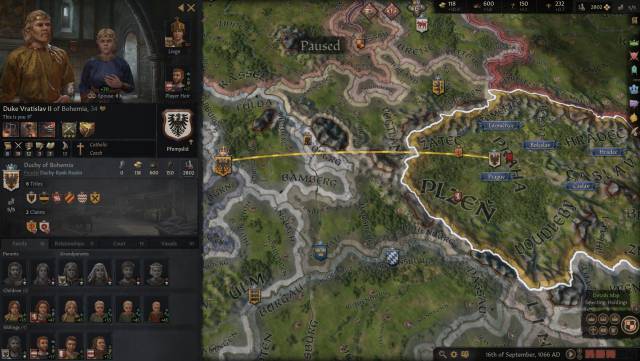
This design decision has modified the game’s interface by deleting menus dedicated to the economy or commerce and including in the foreground those related to the palace intrigues, the council, the core of the factions and the most serious frictions with the feudal lords, and dynastic management, one of the novelties of this new installment. The management of the dynasty and the personal characteristics, together with its achievements, assumed by its members will open advantages for the player represented by a skill tree. Being considered as dynastic heads will offer the player a series of advantages over the rest of its members. In order to maintain the position of dynastic leadership, it will be of special relevance to arrange marriages and to elaborate intrigues that allow the members of the dynasty to aspire to noble titles and create legacies, that is, events of such special depth that they come to be remembered once they have occurred. All of this will allow us to enter periods of splendor, moments in the game that will significantly raise the attributes of the main character and their management.
The management of the main character is another of the great facets of the game and one of the design elements that have been most modified. Now the player will be able to choose different paths that will lead to acquiring permanent traits. These paths will be favored by the different abilities that this character presents. That is, if the king has a very high intrigue, he can choose the intrigue as a “way of life” and gradually unlock skills and possibilities until he reaches a definitive and permanent trait. In this way we can control in a more detailed way the evolution of the rulers as if it were a role-playing game. They have also opened up new possibilities for relationships with other characters, from marriage to the possibility of romantic affairs, both heterosexual and homosexual.
The great asset of this new design is that all the personal decisions we make will have consequences in the game, both in the short, medium or long term, and will have their representation through the decrease or increase in the level of skills, the stress of the character, or in the acquisition of traits that will modify the relationships established by the player. A design, both dynastic and character, that makes Crusader Kings III an even deeper and more complex game.
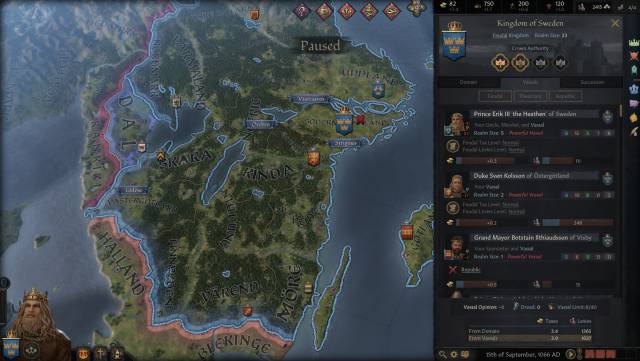
In the management of the dynasty and the character, intrigue occupies a fundamental role in this new saga. For example, and that this description serves as advice, if we choose to start the game with Alfonso VI of León, the first thing we must do is start intrigues against our brothers, Sancho II of Castilla and García I of Galicia, since their deaths will allow us to inherit the kingdoms of both Castilla and Galicia, recomposing the inheritance of Fernando I. This is just one example, intrigues can be developed to end someone’s life, to improve the relationship with another character, to make him fall from grace, etc. Each of these intrigues will have random events that will enrich the game and allow them to advance or rewind. To these intrigues are added the hooks, that is, the knowledge of secrets that the protagonist character has and can take advantage of to his advantage. If in the previous installments the management of the vassals occupied most of the time, in this new installment intrigue will be the player’s main concern.
War, culture and religion
The other activity that will occupy the player more time will be warfare, especially continental warfare, since maritime warfare is not developed in the game. Wars can be started through “casus belli”, which are reduced to invade a territory, making vassals to all the leaders of the invaded space, and to take a specific place, which can be a county or a duchy. The cost of starting a war will be measured in terms of prestige or religion, a valid war will subtract and vice versa. Once the war has begun, the player must be aware of three elements: the opinion of the vassals towards the war, the expenditure on soldiers and the number and quality of the troops. The rest will work like all other video games in the company. Units will appear on the map that must be guided through the different territories to carry out two main activities: combat and sieges. The first ones will appear, as it happened in Imperator: Rome, by means of green flags, if there is a chance of winning, yellow if the result is uncertain, or red, the combat will be lost. In this way, the number of troops and their efficiency on the map can be managed in the best possible way. We must also take into account, of course, the quality of the troops, the general’s mastery, the terrain, the recruitment, or training, of military orders, the hiring of mercenaries, etc.
On these two main activities: family management and war, the rest of the activities that the video game allows are built, however they are not the only ones. The best history titles are those that allow the player to interact with the past in the most varied ways possible. The Paradox saga has always provided the best examples. Crusader Kings III, in addition to everything mentioned: intrigues, wars, marriages, dynastic conflicts, etc., allows you to carry out other equally interesting actions. For example, if we start at the first beginning, during the last decades of the 9th century, choosing the Umayyad Emirate of Al-Andalus, we can observe how many of the vassals under the emir’s rule have very few Arab features, both their names and their features. cultural are Christian, that is, they represent the Muladids.
This cultural difference will cause friction with the emir, Arab and Muslim, and will trigger events through which we can carry out different actions such as trying to modify their culture, bring them closer to the ruler’s family so that they absorb his features, give them gifts to get their friendship, etc. The possibilities that the game allows to relate to the past are very wide and heterogeneous, ranging from a violent modification of culture to sexual attraction to win the favor of the other.
This situation is equally extrapolated to the religious aspect. The game includes religions in faiths, within them we find the different existing interpretations of the creeds and the player can even create one to suit him. Religions, and cultures, impose a series of restrictions that can be modified by the player throughout the game. In addition, the relationships that we establish with bishops, also those of Rome, will have serious consequences for the game, from counting the favor of the religious institution to being excommunicated, an event that will cause heavy penalties in the game. A similar fact occurs with the forms of government that will range from the most decentralized and limited to, in the later stages, the most centralized and strengthened in which the feudal lord will have absolute control of his territory, the ultimate aspiration of the game.
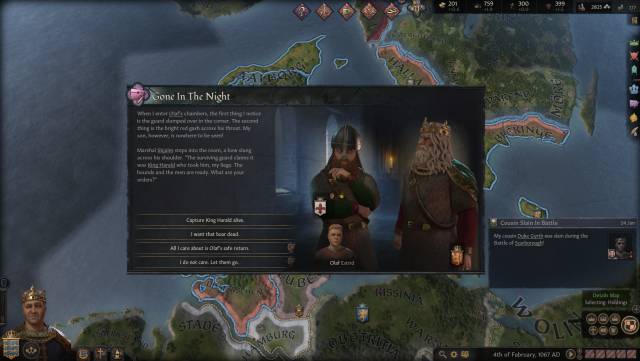
This variety of possibilities is multiplied by each site chosen. If instead of choosing the first example we opted for choosing a Nordic territory during those same dates, we will have at our disposal a variety of options related to the Vikings and their expansion throughout Europe, including the famous forays across the Atlantic. eastern and the Mediterranean. The great asset of this new installment is the inclusion, from the beginning, of a gigantic geographical space that was developed through the fifteen expansions of the previous installment. Starting the game with all these possibilities at our disposal turns Crusader Kings III into an infinite game that, although it is limited in financial and commercial management, offers hundreds of possibilities.
The differentiation between territories, cultures, religions and governments is equally well represented, although in lesser-known places there is less work of differentiation, a logical situation given the scarce historical information available for certain times and places. Aspect that, probably, will expand as the years of the game’s life pass.
CONCLUSION
Crusader Kings III is a work called to become a reference. It gathers all the tradition of the saga, contributes what it has learned along the way and adds the facets most demanded by the players, such as the management and meticulous control of private life and the dynasties present in the game. Elements still need to be added, both already present in the saga and forgotten by it, such as trade, both land, fairs were of vital importance for the time, as well as maritime, deepening the religious aspect, especially in the conflicts derived from He, the development of technique and technology, not included in the video game, or artistic development, remains to comment on the fundamental importance of churches, cathedrals and pilgrimage centers during the Middle Ages. Aspects that, probably, will be included throughout expansions but that we miss in the total representation of the medieval period that the game tries to make, based on intrigue and family drama and great battles. Anyway, and in conclusion, this new installment of Crusader Kings III maintains all the tradition of high strategy and includes aspects that will attract new audiences. It also has great educational potential since, although it is based on the counterfactual story (what would have happened if …?), It extends the vassalage model to territories where it did not exist and fills in the gaps in the investigation through fiction, it provides a virtual model of the feudal system rarely seen in a cultural work.
THE BEST
- The gigantic space and time that the game offers.
- The quality of the historical representation
- The narrative that emerges during the game turns each of them into unique and special plots.
- Greater control of the management and control of privacy present in the game
- Great educational potential
WORST
- The scant attention to economic and commercial aspects
- The lack of innovation in sections such as the military
- The low presence or relevance of the population and civil society
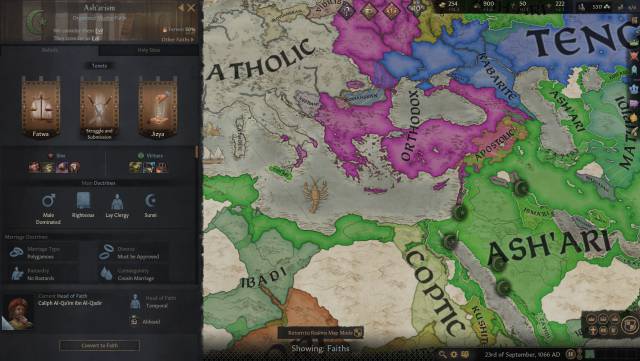
Excellent
A benchmark title of its kind, which stands out above its competitors and that you will enjoy from start to finish, probably several times. A game destined to become a classic over the years.
